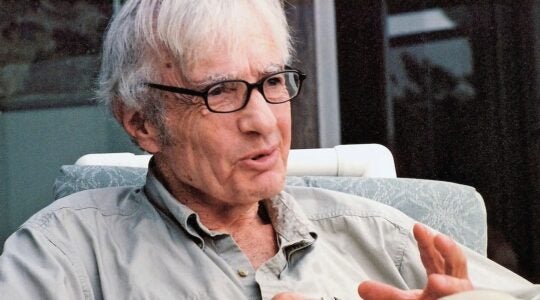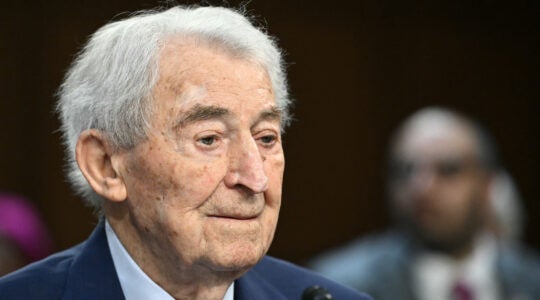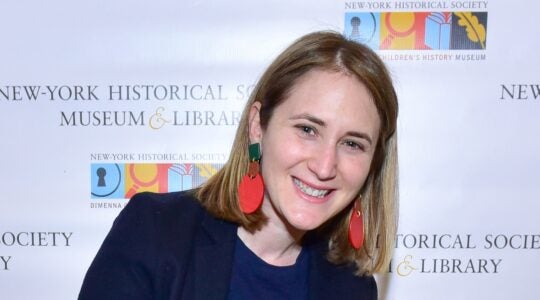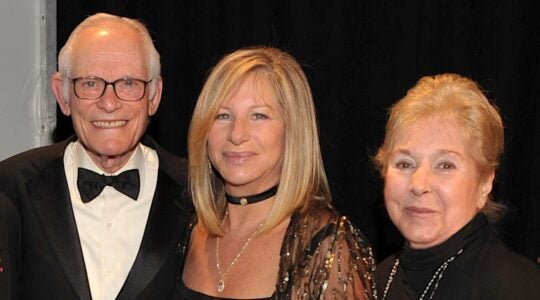(JTA) — Cantor Philip Sherman’s biggest audience might have been for his role as a judge on the Netflix series “Orange is the New Black.” But his most prominent role was as one of New York’s most in-demand mohels, performing, by his own estimate, more than 26,000 circumcisions during his 45-year career.
The tally included the offspring of celebrities, babies born in far-flung countries and his own sons and grandsons. “My record is 11 in one day – [two pairs] of twins and seven others,” Sherman told the Jewish Telegraphic Agency in 2014, in an article naming him one of “America’s Top Mohels.”
That record stood for the rest of his life. Sherman died at 67 Wednesday in New York City. The cause was pancreatic cancer, according to his family; optimistic and determined throughout his yearlong battle, he had announced a six-month sabbatical in June.
“It was always family first” for Sherman, his daughter Nina Sherman Green told JTA, even as he participated in the formative moments of thousands of Jewish families. She recalled the hours he spent teaching her and her two brothers the skills he considered essential: how to read from the Torah, how to root for the New York Giants and, perhaps most of all, how to drive.
The last was in some ways pragmatic: Sherman’s work had him ping-ponging across New York City and its suburbs daily, from early in the morning until dusk. (Circumcisions must be performed during the day, according to Jewish law.) There was lots of time to practice, and many places to be.
His children learned to navigate the city’s highways and side streets. He also demanded that they be able to parallel park in 20 seconds. Sometimes, though, their job was to wait in the car and fend off parking enforcement as Sherman raced inside, wearing his signature bow tie, to perform the ceremony that Jewish tradition considers essential to bringing baby boys into a covenant between them and God.
“He would run in, run out because it was important to him to cover as many brisses as he could,” said his son Elan Sherman, who was with him on the record-setting day. “He wanted to leave that mark on the Jewish community, that he was really there as much as he could be for all Jewish babies.”

Cantor Philip Sherman poses with his children, their spouses and his grandchildren in a 2022 family photo. (Courtesy Sherman family)
Green noted that her father would emphasize to parents that they should not be deterred if they or anyone else they knew could not afford his fee.
“He did many on the house, and it was something that he was really grateful that he was able to do,” she said, adding, “Living day to day, knowing that he was doing mitzvot for everybody, that gave him a lot of pride.”
A typical Phil Sherman bris was fast and funny. He was known for adding levity around a procedure that often induces great anxiety. But he was also deeply proud of his part in carrying on a tradition that dates back to the Bible.
“I’m there to fulfill a Torah commandment, to educate, let them know what the significance is, briefly, appropriately, tastefully,” he once told the New York Times about a procedure that would take him between 15 to 20 seconds to perform. (He believed that doctors who work as mohels, increasingly the norm in some Jewish communities, unnecessarily add discomfort for babies and their parents.)
In the same article, Sherman also listed the celebrity offspring for whom he performed the procedure, including the grandchildren of two Israeli prime ministers, the sons of movie stars and other celebrities, including actress Rachel Weisz, and the son of the then-Manhattan borough president, Scott M. Stringer.

Cantor Philip Sherman, at center, poses with the stars of “The Marvelous Mrs. Maisel,” on which he had a consulting role in 2022. (Courtesy Sherman family)
Sherman was himself a celebrity of some note. Articles about the modern, pager-carrying mohel appeared in local media by the early 1990s, and the creation in 1997 of his website — emoil.com — occasioned an “Only in New York” brief in the New York Post. (His vanity plate had the URL.) A profile in the New Yorker followed two years after that. That was also the year that he stood alongside Whoopi Goldberg in an ad for a short-lived online currency called Flooz. In 2009, New York Magazine featured him as “the busiest mohel in New York” — complete with a photograph showing him surrounded by 30 babies he’d recently circumcised.
A member of the Screen Actors Guild, Sherman played rabbis in small roles on TV and film and consulted with creators who wanted to get the Jewish details right. In 2011, he was cast in “Our Idiot Brother,” the Paul Rudd vehicle. “I played a mohel, but the scene was cut,” Sherman told JTA. “How ironic.”
He played a character billed as “Aliyah Man” in an episode of “The Marvelous Mrs. Maisel.” In “Orange is the New Black,” about a women’s prison, he had a brief scene as a judge presiding over a trial involving one of the prisoners.
“The really amazing thing about that is that it’s a real part in a real show, where I’m not playing a rabbi or cantor or some Jewish guy,” he told JTA at the time.

Cantor Philip Sherman played a judge on a 2018 episode of “Orange is the New Black.” (Netflix)
Sherman grew up in Syracuse, New York, where his family had little money or connection to Jewish practice. Inspired by the religious observance of his grandparents on the Lower East Side, he enrolled in the joint program at Columbia University and the Jewish Theological Seminary, graduating in 1979 with degrees in music and Bible. While still an undergraduate, he received training and certification as a mohel from the former chief mohel of Jerusalem, the late Rabbi Yosef Hakohen Halperin.
“Cantor Sherman was a beloved friend and colleague,” Cantor Mark Kushner, one of the mohels to whom Sherman directed families during his leave, told JTA on Wednesday. “We trained together in Jerusalem over 45 years ago. We spoke nearly every day. I will miss him dearly.”
Adept in leading prayer according to both the Ashkenazi and Sephardic traditions, Sherman also served as cantor at a number of Manhattan synagogues, including Park East Synagogue, Lincoln Square Synagogue and Congregation Shearith Israel-The Spanish and Portuguese Synagogue, where he worked full time early in his career and returned on a part-time basis more recently.
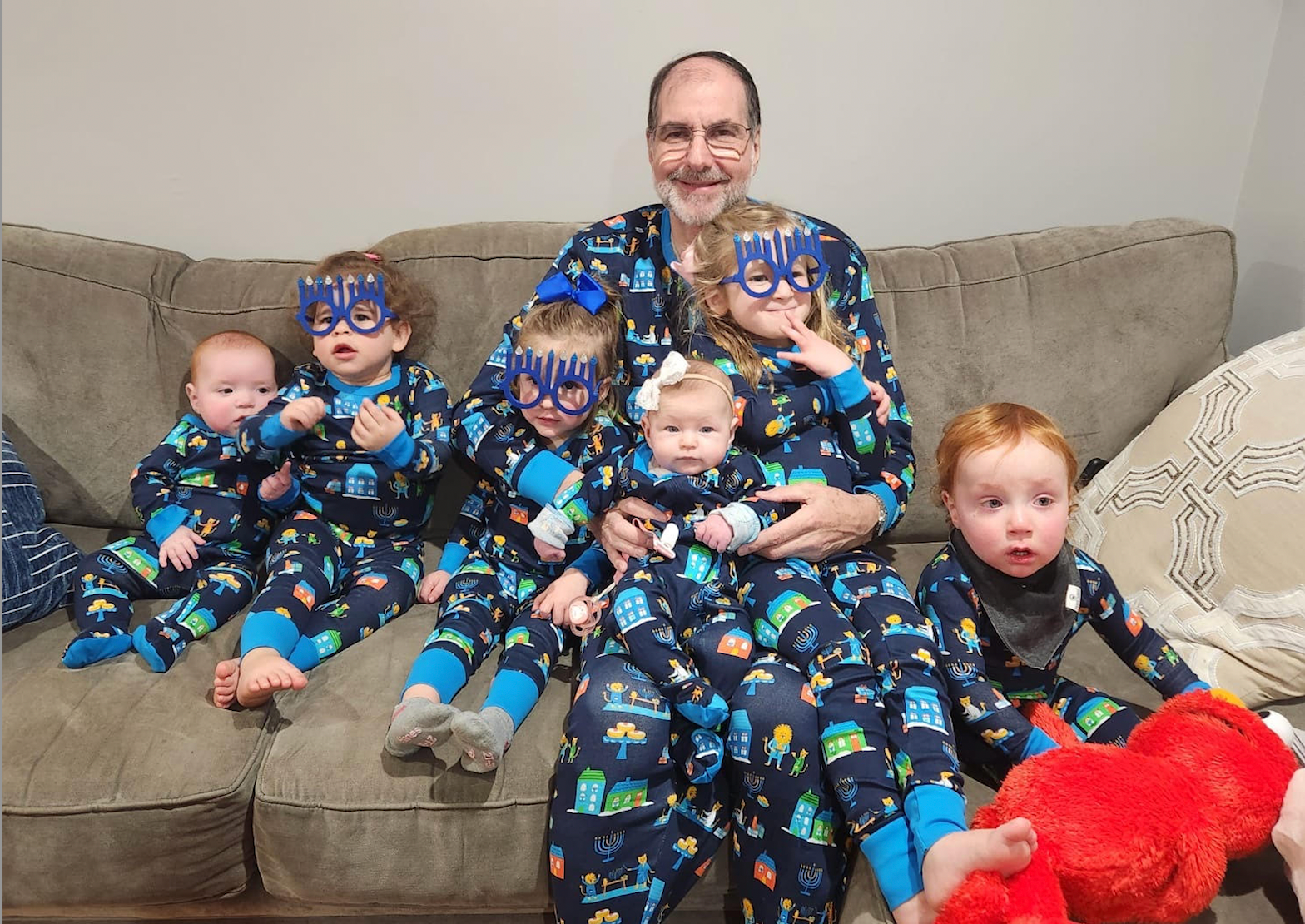
Philip Sherman sits with his six grandchildren during Hanukkah in 2022. (Courtesy Sherman family)
Sherman boasted about being the only motorcycle-riding rabbi in the actors union, and his love of driving — and steering others on the right path — remained a constant of his life and work.
Even in his final weeks, Green said, Sherman was offering driving pointers on his way to hospital appointments. “He was still directing me,” she said. “He was still being a backseat driver in the front seat, which was his role. He was still navigating … and making sure I knew which lane to be in.”
Sherman is survived by his children, Nina, Elan and Reuven; their spouses and six grandchildren.
JTA has documented Jewish history in real-time for over a century. Keep our journalism strong by joining us in supporting independent, award-winning reporting.


